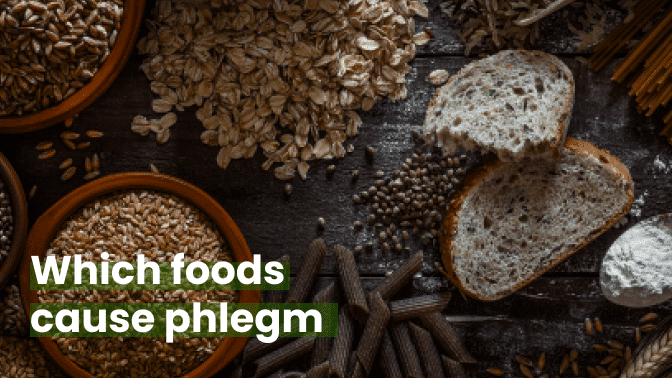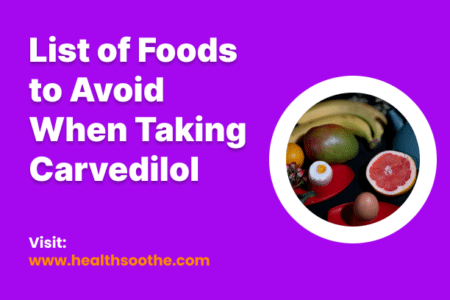Phlegm, also known as mucus, is a thick, sticky substance that lines the respiratory tract. It is produced by the body to protect the lungs and airways from irritants such as dust, smoke, and other harmful particles.
However, excess phlegm can cause discomfort and even lead to respiratory infections. Certain foods can exacerbate phlegm production, making it difficult to breathe and causing other respiratory symptoms.
Here are some of the foods that can cause phlegm:
1. Dairy Products
Dairy products such as milk, cheese, and yoghurt are high in casein, a protein that can increase the production of mucus. In addition, dairy products are often high in fat, which can also contribute to excess phlegm production.
If you notice that dairy products exacerbate your phlegm production, try limiting your intake or switching to non-dairy alternatives.
2. Fried and Processed Foods
Fried and processed foods are often high in salt, sugar, and unhealthy fats. These foods can cause inflammation in the respiratory tract, leading to increased phlegm production.
In addition, these foods can weaken the immune system, making it more susceptible to respiratory infections. To reduce phlegm production, try to limit your intake of fried and processed foods and opt for healthier alternatives.
3. Sugary Drinks
Sugary drinks such as soda and fruit juice can contribute to excess phlegm production. These drinks are often high in sugar and can cause inflammation in the respiratory tract.
In addition, sugary drinks can weaken the immune system, making it more susceptible to respiratory infections. To reduce phlegm production, try to limit your intake of sugary drinks and opt for water or herbal tea instead.
4. Alcohol
Alcohol can contribute to excess phlegm production by dehydrating the body. When the body is dehydrated, it produces more mucus to protect the respiratory tract.
In addition, alcohol can weaken the immune system, making it more susceptible to respiratory infections. To reduce phlegm production, try to limit your intake of alcohol and opt for water or other non-alcoholic beverages.
5. Caffeine
Caffeine can contribute to excess phlegm production by dehydrating the body. When the body is dehydrated, it produces more mucus to protect the respiratory tract.
In addition, caffeine can cause inflammation in the respiratory tract, leading to increased phlegm production. To reduce phlegm production, try to limit your intake of caffeine and opt for water or herbal tea instead.
Read Also: Pegan diet food list: Everything you need to know
Benefits of phlegm
While excess phlegm can be uncomfortable and even lead to respiratory infections, it is important to note that phlegm does serve several important functions in the body. Here are some of the benefits of phlegm:
1. Protects the Respiratory Tract
Phlegm serves as a protective barrier in the respiratory tract, trapping dust, bacteria, and other harmful particles that could potentially cause damage or infection. It also helps to moisten and lubricate the respiratory tract, preventing it from becoming dry and irritated.
2. Helps to Expel Foreign Substances
Phlegm helps to expel foreign substances from the respiratory tract, such as pollen or dust. This helps to prevent these substances from entering the lungs and causing damage or infection.
3. Indicates Infection or Illness
Excess phlegm production can be a sign of infection or illness. It can indicate that the body is working to fight off an infection or that there is an underlying respiratory condition that needs to be addressed.
4. Provides Information to Healthcare Providers
Phlegm can be analyzed by healthcare providers to provide information about the underlying condition or infection. This can help to guide treatment and ensure that the appropriate medications or therapies are prescribed.
While excess phlegm can be uncomfortable and even lead to respiratory infections, it does serve several important functions in the body. Phlegm protects the respiratory tract, helps to expel foreign substances, indicates infection or illness, and provides information to healthcare providers.
Food to eat that reduces Excess Phlegm
Excess phlegm can be uncomfortable and even lead to respiratory infections. Certain foods can help to reduce phlegm production, making it easier to breathe and improving overall respiratory health. Here are some of the foods that can help to reduce excess phlegm:
1. Ginger
Ginger is a natural anti-inflammatory and can help to reduce inflammation in the respiratory tract. It also has antiviral and antibacterial properties, which can help to prevent respiratory infections. Ginger can be consumed in many ways, including fresh, grated into tea or added to meals.
2. Garlic
Garlic has been used for centuries as a natural remedy for respiratory infections. It has antiviral and antibacterial properties that can help to boost the immune system and prevent respiratory infections. Garlic can be added to meals or consumed in supplement form.
3. Honey
Honey has natural antibacterial properties and can help to soothe the respiratory tract. It can also help to thin out mucus, making it easier to expel. Honey can be consumed on its own or added to warm water or tea.
4. Turmeric
Turmeric is a natural anti-inflammatory and can help to reduce inflammation in the respiratory tract. It also has antioxidant properties that can help to boost the immune system. Turmeric can be consumed in many ways, including fresh, grated into tea or added to meals.
5. Leafy Greens
Leafy greens such as spinach, kale, and collard greens are rich in vitamins and minerals that can help to support respiratory health. They are also high in antioxidants, which can help to boost the immune system. Leafy greens can be added to salads, smoothies, or cooked meals.
6. Citrus Fruits
Citrus fruits such as oranges, lemons, and grapefruits are high in vitamin C, which can help to boost the immune system and prevent respiratory infections. They also have natural antibacterial properties that can help to fight off infections. Citrus fruits can be consumed on their own or added to meals or drinks.
7. Warm Liquids
Warm liquids such as water, herbal tea, and soup can help to thin out mucus, making it easier to expel. They can also help to soothe the respiratory tract and provide hydration. Warm liquids can be consumed throughout the day.
Conclusion
Excess phlegm production can be uncomfortable and even lead to respiratory infections. Certain foods can exacerbate phlegm production, making it difficult to breathe and causing other respiratory symptoms.
To reduce phlegm production, try to limit your intake of dairy products, fried and processed foods, sugary drinks, alcohol, and caffeine. Opt for healthier alternatives such as water, herbal tea, and nutrient-rich foods to keep your respiratory tract healthy and phlegm-free.



